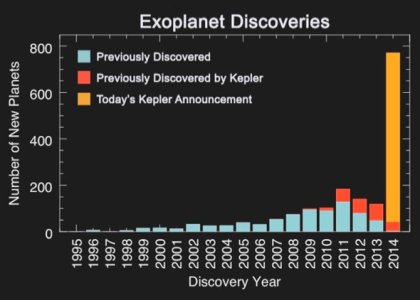N_LaRUE
New member
- Apr 3, 2013
- 28,641
- 0
- 0
But what is intelligence? At the most basic meaning, isn't intelligence simply the ability to recognize and solve problems for the immediate benefit of the individual and, later, the benefit of the species? If you accept that definition, then intelligent life has flourished on Earth, and just might as well be flourishing elsewhere in the cosmos at the same level of intensity.
Well, yes that is a basic definition of intelligence, some say that simply recognizing your reflection is a sign of intelligence because you have a definition of 'self'. Intelligence can mean many things. A single bee might not be very smart, but a swarm could be very intelligent, group think is what it's often referred to. That's why I said, what is your definition of intelligent life? If it means 'similar to humans' then I think, going by our own world, that percentage is very low, like 50%. If by simply sentient beings, then I think very high.
I really like your "new" solar system position. Not many people mention that what we observe at great distances is merely a reflection of light, of which the reflective source might no longer still be there. Awesome! But, might their be non-planet bound intelligent life out there??? Just throwing that out there.Great conversation, by the way.
If you're referring to beings who may have boarded a ship and are roaming the universe then, yes that's possible. Thing is they would have to have very advanced systems to survive in such a harsh environment. Not saying it isn't possible but that is quite a stretch for us to think at this stage. The beings would have to evolve to deal with the environment if they don't have those systems. We already know from our own experiences that surviving in space for any length of time has detrimental effects on our bodies. Is it possible to procreate in zero gravity? Can you survive in a recycled air system without encountering disease? What happens if disease breaks out. These are the things that cross my mind when I think of long length space travel. So much can go wrong. Star Trek makes it looks simple.


